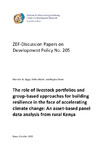| dc.description.abstract | This study examines the impact of multiple shocks on assets by employing two waves of a
panel data set of 360 rural households in three agro-ecological zones in Kenya. To control for
unobserved heterogeneity, a ‘within’ household fixed effects model was employed. One
major finding is that climatic shocks negatively affect households’ livestock holdings -apart
from small ruminant and non-ruminant livestock due to their higher adaptive capacity.
Consequently, households rely on two major coping strategies to smooth their consumption
level: (1) adjusting their livestock portfolios, and (2) borrowing from group-based
approaches. The latter strategy is particularly important for poor households in safeguarding
their already low asset base. The findings suggest that livestock protection policies, such as
diversification of livestock portfolios, promotion of fodder banks and index-based livestock
insurance, are substantial. Scaling-up of group-based approaches would augment poor
households’ recovery and resilience against multiple shocks in the face of accelerating
climate change. | en_US |

